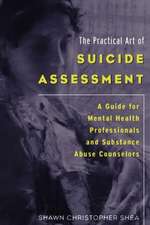Python for Experimental Psychologists
Autor Edwin S. Dalmaijeren Limba Engleză Paperback – 12 oct 2016
Python for Experimental Psychologists provides researchers without prior programming experience with the knowledge they need to independently script experiments and analyses in Python. The skills it offers include: how to display stimuli on a computer screen; how to get input from peripherals (e.g. keyboard, mouse) and specialised equipment (e.g. eye trackers); how to log data; and how to control timing. In addition, it shows readers the basic principles of data analysis applied to behavioural data, and the more advanced techniques required to analyse trace data (e.g. pupil size) and gaze data.
Written informally and accessibly, the book deliberately focuses on the parts of Python that are relevant to experimental psychologists and cognitive neuroscientists. It is also supported by a companion website where you will find colour versions of the figures, along with example stimuli, datasets and scripts, and a portable Windows installation of Python.
| Toate formatele și edițiile | Preț | Express |
|---|---|---|
| Paperback (2) | 287.93 lei 22-36 zile | +19.47 lei 5-11 zile |
| Taylor & Francis – 11 noi 2024 | 287.93 lei 22-36 zile | +19.47 lei 5-11 zile |
| Taylor & Francis – 12 oct 2016 | 447.51 lei 22-36 zile | |
| Hardback (1) | 935.68 lei 43-57 zile | |
| Taylor & Francis – 11 noi 2024 | 935.68 lei 43-57 zile |
Preț: 447.51 lei
Nou
Puncte Express: 671
Preț estimativ în valută:
85.63€ • 89.65$ • 70.85£
85.63€ • 89.65$ • 70.85£
Carte disponibilă
Livrare economică 17-31 martie
Preluare comenzi: 021 569.72.76
Specificații
ISBN-13: 9781138671577
ISBN-10: 1138671576
Pagini: 228
Ilustrații: 11 Line drawings, black and white; 13 Halftones, black and white; 6 Tables, black and white
Dimensiuni: 174 x 246 x 15 mm
Greutate: 0.41 kg
Ediția:1
Editura: Taylor & Francis
Colecția Routledge
Locul publicării:Oxford, United Kingdom
ISBN-10: 1138671576
Pagini: 228
Ilustrații: 11 Line drawings, black and white; 13 Halftones, black and white; 6 Tables, black and white
Dimensiuni: 174 x 246 x 15 mm
Greutate: 0.41 kg
Ediția:1
Editura: Taylor & Francis
Colecția Routledge
Locul publicării:Oxford, United Kingdom
Public țintă
Postgraduate, Professional, and UndergraduateCuprins
1. Python 2. Variable types Make some noise 3. Creating and presenting stimuli 4. Processing responses Make some noise 5. Scripting an experiment Make some noise 6. Analysing behavioural data 7. Analysing traces 8. Eye tracking 9. Getting help
Notă biografică
Edwin S. Dalmaijer is an Early Stage Research Fellow in the Department of Experimental Psychology, University of Oxford. He has authored several Python libraries, standalone software packages, teaching materials, and research articles.
Descriere
Python for Experimental Psychologists provides researchers without prior programming experience with the knowledge they need to independently script experiments and analyses in Python. Written informally and accessibly, the book deliberately focuses on the parts of Python that are relevant to experimental psychologists and cognitive neuroscientists.
Recenzii
'Programming in Python is an invaluable skill for psychology researchers, for both making experiments and analysing the resulting data.'
Christopher R Madan, author of Memories That Matter: How We Remember Important Things, Academia and the World Beyond book series on post-PhD careers, and An Introduction to MATLAB for Behavioral Researchers
Praise for previous edition
'An easy-to-read introduction. In a humorous style it introduces the reader to programming in Python, picking them up where they are as experimental psychologists. Very useful indeed!'
Ulrich von Hecker, Senior Lecturer, Cardiff University, UK
'Edwin Dalmaijer provides an intuitive introduction into psychological experimentation using Python libraries co-developed by the author himself. Well-structured and easy to read, this book will quickly have you programming, running and analysing your own experiments using open, modern tools.'
Tomas Knapen, Assistant Professor Cognitive Neuroscience, Vrije Universiteit Amsterdam, The Netherlands
'Python is fast becoming the lingua franca of scientific research, and this excellent and highly accessible book fills a much-needed gap for experimental psychologists. The strong focus on developing genuinely useful experimental code, and the comprehensive examples included, make it an outstandingly useful resource not just for students, but for seasoned researchers as well. Certainly the best (and funniest!) introduction to Python I’ve come across.'
Matt Wall, Imaging Scientist, Imperial College London, UK
Christopher R Madan, author of Memories That Matter: How We Remember Important Things, Academia and the World Beyond book series on post-PhD careers, and An Introduction to MATLAB for Behavioral Researchers
Praise for previous edition
'An easy-to-read introduction. In a humorous style it introduces the reader to programming in Python, picking them up where they are as experimental psychologists. Very useful indeed!'
Ulrich von Hecker, Senior Lecturer, Cardiff University, UK
'Edwin Dalmaijer provides an intuitive introduction into psychological experimentation using Python libraries co-developed by the author himself. Well-structured and easy to read, this book will quickly have you programming, running and analysing your own experiments using open, modern tools.'
Tomas Knapen, Assistant Professor Cognitive Neuroscience, Vrije Universiteit Amsterdam, The Netherlands
'Python is fast becoming the lingua franca of scientific research, and this excellent and highly accessible book fills a much-needed gap for experimental psychologists. The strong focus on developing genuinely useful experimental code, and the comprehensive examples included, make it an outstandingly useful resource not just for students, but for seasoned researchers as well. Certainly the best (and funniest!) introduction to Python I’ve come across.'
Matt Wall, Imaging Scientist, Imperial College London, UK









